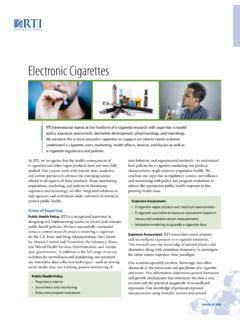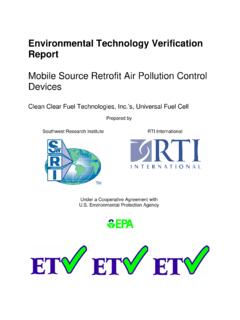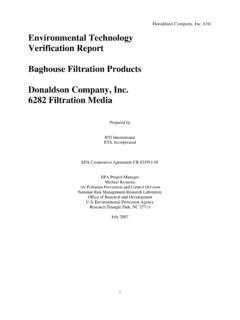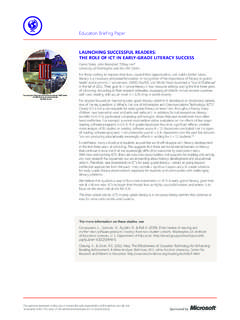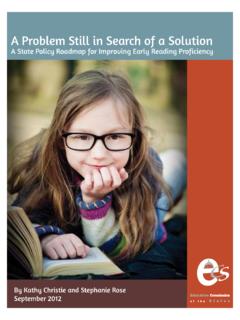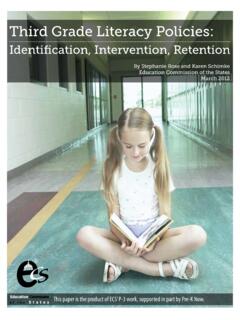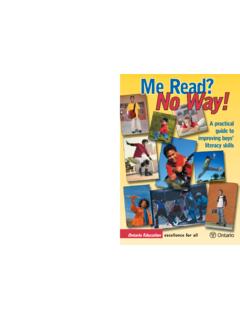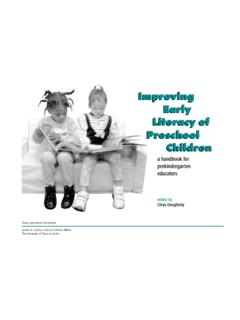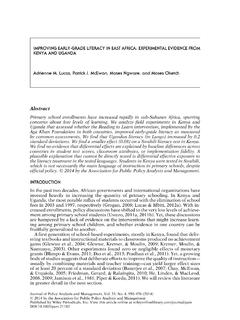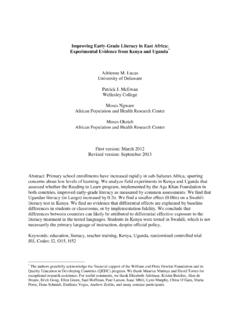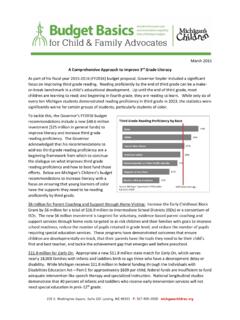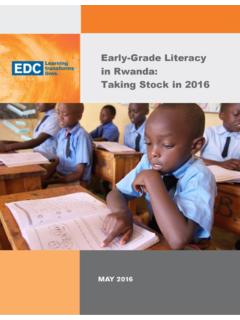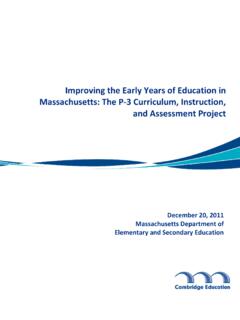Transcription of Early Reading: Igniting Education for All
1 Education is not the filling of a the lighting of a fire. W. B. Yeats Early reading : Igniting Education for AllA report by the Early grade Learning Community of PracticeREVISED EDITIONE arly reading : Igniting Education for AllA report by the Early grade Learning Community of PracticeREVISED EDITIONAll Photos: RTI InternationalSuggested Citation: Gove, A. and P. Cvelich. 2011. Early reading : Igniting Education for All. A report by the Early grade Learning Community of Practice. Revised Edition. Research Triangle Park, NC: Research Triangle Institute. 2011 Research Triangle Institute.
2 RTI International is a trade name of Research Triangle rights reserved. Please note that this document is copyrighted and credit must be provided to the authors and source of the document when you quote from it. You must not sell the document or make a profit from reproducing it. ContentsAcknowledgments vIntroduction: reading in the Dark vi1. The Missing Spark to Learning 12. Early reading : Strike While the Iron is Hot 43. Warning Lights: Results of reading Assessments Around the World 104. Assessment: Illuminating the reading Deficit 185. Teaching: Lighting a Fire in Every Child 246.
3 Mobilization: Stoke a Movement for Early grade reading 34 Conclusion: Lampposts on the Path to Education Quality 42 Appendix: Early grade reading Assessments Tracker 47 References 51ivTablesTable 1. Stages of reading Development 6 Table 2. Summary of National and Regional Early reading Assessment Findings, 2008 2009 13 Table 3. Summary of Program Evaluation Early reading Assessment Baseline Findings, 2007 2010 15 Table 4. Early grade reading Assessment Components 20 Table 5. Rubric for Early grade reading Assessment Approaches 21 Figures Figure 1. Gross Primary School Enrollment in High-Income and Low-Income Countries, 2000 2008 2 Figure 2.
4 Primary School Completion in High-Income and Low-Income Countries, 2000 2008 2 Figure 3. The Gambia: Percentage of Students Who Could Not Read a Single Word, 2007 and 2009 9 Figure 4. The Gambia: Percentage of grade 2 Students reading with At Least 80% Comprehension 9 Figure 5. Percentage of Students Who Could Not Read a Single Word, 2008 2009 12 Figure 6: Percentage of Students reading with At Least 80% Comprehension in grade 2, 2008 2010 14 Figure 7. Assessment of Early grade reading Deficits Around the World 22 Figure 8. Liberia: Rates of Improvement in Oral reading Fluency Among Treatment and Control Schools, 2009 2010 27 Figure 9.
5 Liberia: Rates of Improvement in Comprehension Among Treatment and Control Schools, 2009 2010 27 Figure 10. Liberia: Percentage of grade 2 Students reading with At Least 80% Comprehension, Baseline and Final Results 28 Figure 11. South Africa: Percentage of grade 1 Students Who Could Not Read a Single Word or Identify a Single Letter, Pre- and Post-Test Results 31 Figure 12. Mali: grade 1 and grade 2 Letter Identification Scores, Baseline and Mid-Term Results 33 Figure 13. Malawi: Percentage of grade 2 and grade 4 Students Who Could Not Read a Single Word in Chichewa, Pre- and Post-Test Results 41 Figure 14.
6 Nepal: Percentage of grade 2 Students Who Could Not Identify Letters or Read Words, Pre- and Post-Test Results 41vAcknowledgmentsChildren, teachers, and parents in low-income countries around the world are the main focus of this report. Every day they face the challenge of creating learning with minimal materials in austere classrooms and homes. A diverse community of practice a group of government officials, donor and nongovernmental organization (NGO) staff, and university researchers has come together under the banner of reading to support these children, teachers, and parents in their pursuit of Education quality (a description of this community of practice is presented on the back cover).
7 The following report on Early grade reading assessment and improvement is a result of their collective efforts to develop and refine assessment tools, pilot interventions, and share practices for scaling up successful models. This report was authored by Amber Gove and Peter Cvelich of RTI International, with contributions from Elizabeth Adelman (Academy for Educational Development [AED]), Anita Anastacio (International Rescue Committee), Rukmini Banerji (Pratham), Colette Chabbott (George Washington University), Amy Jo Dowd (Save the Children), Burama Jammeh (Ministry for Basic and Secondary Education , The Gambia), and Sara Ruto (Uwezo Initiative).
8 RTI contributors included Michael Costello, Joseph DeStefano, Madeline Garant, Medina Korda, Jessica Mejia, Emily Miksic, Souhila Messaoud-Galusi, Benjamin Piper, Alison Pflepsen, Sarah Pouezevara, Wendi Ralaingita, Carol da Silva, and Carmen Strigel. Peer reviewers included Anda Adams (Center for Universal Education , The Brookings Institution), Penelope Bender (Consultant, The William and Flora Hewlett Foundation), Luis Crouch (RTI), Marcia Davidson (University of Utah), David Edwards (National Education Association), Melinda Taylor (RTI), Sylvia Linan-Thompson (University of Texas at Austin), and Richard Long and Sakil Malik (International reading Association).
9 The authors are grateful for the editing and comments provided by Myles Elledge, Hiske Leegstra, Ellen Lohr-Hinkel, Erin Newton, and Catherine Raymond, all of RTI. The design of this report was created by RTI s Design Services, with support from Hiske Leegstra and Lauren O Bray (RTI). Errors or omissions are the sole responsibility of the for a moment and imagine that you are an illiterate child. A textbook sits on a desk in front of you, and you cannot read it. You are surrounded by a classroom of children. Many of them do not have a book in front of them. In this regard, you are lucky.
10 But to you, the text is still indecipherable. You are accustomed to listening to your school teacher dictate lessons, often in a language that you do not speak or understand and that your parents do not speak with you at home. Without textbooks or training for the basics of teaching reading , your teacher has little choice but to dictate. Now you are presented with a text in an unfamiliar language. Next year, you will be expected to begin learning math and science concepts by reading more books in this language of which you cannot comprehend even one sentence. You are just one of millions of children in low-income countries around the world whose prospects of academic and with it, economic success are dimmed because you cannot necessary as reading is to the success of a child and entire nations many low-income countries overlook the fundamental duty of their school systems to produce readers.




